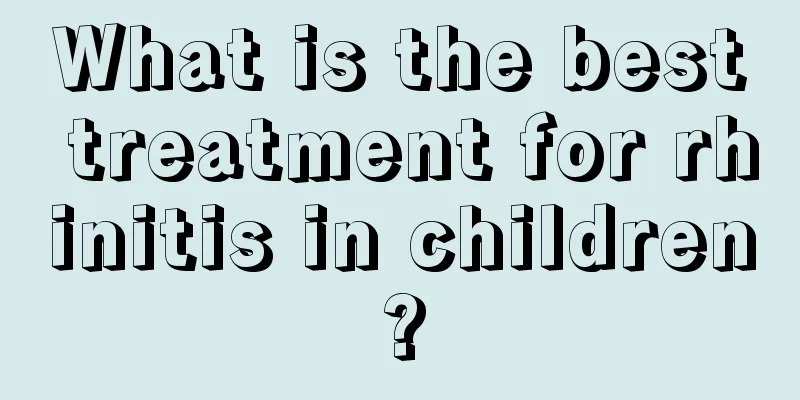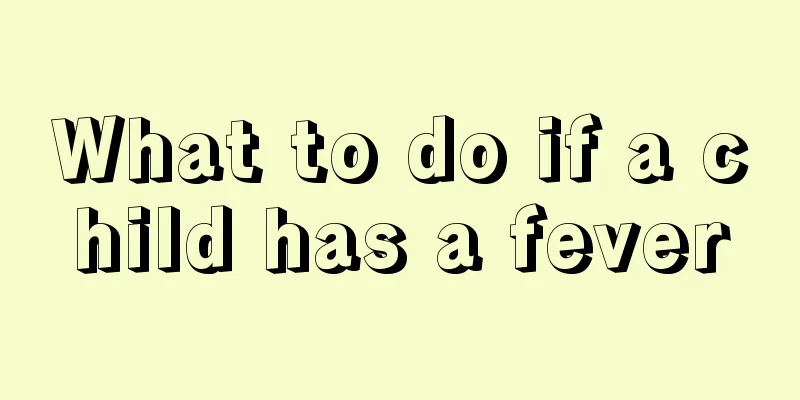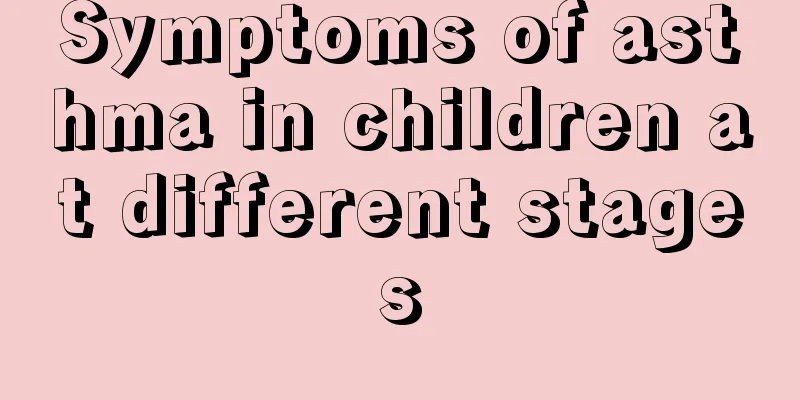What are the symptoms of gingivitis in babies?

|
The health of a baby is always the core of the family. So when the baby's gums are swollen, what should we as parents do? Many children have dental problems. If our baby has this problem, should we go to the hospital for prompt diagnosis and treatment, or can we give the child some medicine to treat it ourselves? Don't worry, just follow me and I believe you will gain a lot. Gingivitis refers to acute or chronic inflammation of dental tissue caused by pathogenic factors. In medicine, the oral mucosa surrounding and covering the teeth and alveolar surfaces is called gums. Since almost everyone will develop chronic gingivitis of varying degrees and scope at some time in their life, gingivitis is the most common disease in humans. It belongs to the category of "Ya Xuan" in traditional Chinese medicine. Causes: According to traditional Chinese medicine, this disease can be caused by unclean oral cavity, which allows food residues to accumulate between the teeth, which eventually decompose into poisonous substances and invade the gums, causing swelling and pain. Or the food may damage the spleen and stomach, spleen deficiency may generate dampness and heat, dampness and heat may accumulate in the stomach and intestines, go up through the meridians, and fumigate the gums, causing stagnation of Qi and blood, obstruction of body fluids, swelling, pain, and hemorrhage. Modern medicine believes that long-term stimulation from dental plaque and local foreign bodies such as tartar, food blockage, and overhanging fillings are the main causes of this disease. Dental deformities, certain systemic factors such as endocrine disorders, vitamin C deficiency, nutritional disorders and systemic diseases can also cause or aggravate gingivitis. Mouth breathing is often an important factor in hyperplastic gingivitis of anterior teeth. Children are extremely susceptible to various oral diseases, among which gingivitis is a common one. reason: 1. Like to eat snacks, especially before going to bed at night. 2. Eating sweets can easily induce tooth decay, and the pain and inability to clean teeth can lead to plaque accumulation. 3. Children have no awareness of oral hygiene and are not aware of brushing their teeth or rinsing their mouths. Symptoms: If you suffer from gingivitis, your gums may become red, swollen, or bleed. If you find that your teeth bleed easily when brushing or your teeth are tender, you need to see a dentist. There are various types of gingivitis, but the most common and highest incidence rate is chronic simple gingivitis, which is called unclean gingivitis and marginal gingivitis again. Gingivitis commonly referred to is exactly chronic simple gingivitis. Chronic simple gingivitis only affects the gingival tissue and does not affect other periodontal tissues. This type of gingivitis is a chronic inflammation caused by plaque on the tooth surface near the gum margin. It has a clear cause and is more common in children and adolescents, with a prevalence of about 70%-90%. Gingivitis usually does not occur before the age of 4-5 years. Most cases start at the age of 5. With age, its prevalence and severity gradually increase, reaching a peak in adolescence. After adolescence, the prevalence of gingivitis slowly decreases with age, and the prevalence of gingivitis in adults is lower. Mild chronic simple gingivitis affects the free gingiva and gingival papillae, while severe cases may affect the attached gingiva and anterior teeth, especially the mandibular anterior teeth, where inflammation is more obvious. Bleeding gums when biting fruit or brushing teeth. Healthy gums will not bleed even if you brush your teeth vigorously. As gingivitis progresses, a large number of capillaries in the gums proliferate and dilate, and they become highly congested. A large number of inflammatory cells and tissue fluid exude, causing gingival hypertrophy that may cover part of the tooth crown. At this time, the gums are dark red or dark red, and are very likely to bleed when probed. If the disease lasts for a long time, it can lead to proliferation of gingival fibers and gingival hyperplasia. At this time, the gums are slightly red or close to normal in color, have a harder texture, and bleed less. Examination and diagnosis are differentiated from the following diseases: 1. Interdental mastoiditis: Mastoiditis is caused by food impaction. There is spontaneous pain, which is characterized by persistent distending pain and pain caused by hot or cold stimulation. Examination revealed congestion and edema of the interdental papillae, obvious tenderness of the local gums, and food often found stuck in the interproximal spaces. 2. Trigeminal neuralgia Trigeminal neuralgia is characterized by sharp pain, sudden onset, severe tearing pain, reflex pain, and distribution along the trigeminal nerve. The difference from acute pulpitis is that trigeminal neuralgia rarely occurs at night. It is mostly triggered by washing the face or talking. Each attack is short, lasting from a few seconds to 1 or 2 minutes, and rarely lasts more than 5 minutes. Cold and hot stimulation do not cause pain, but there are painful points called "trigger points", which will cause pain attacks when touched. 3. Acute maxillary sinusitis Patients with acute maxillary sinusitis often seek medical treatment due to maxillary toothache. Because the roots of the maxillary posterior teeth are connected to the maxillary sinus floor, and the dental pulp nerves of the maxillary posterior teeth pass through the side walls and floor of the maxillary sinus before entering the apical foramen, infection in the maxillary sinus often causes neuralgia in the maxillary posterior teeth and reflects pain in the head and face on the affected side, which is very similar to acute pulpitis, so it should be distinguished. 4. Differentiation of chronic hyperplastic pulpitis from the following diseases: 1. Gingival polyps are mostly caused by adjacent caries and the gums growing into the holes to form polyps. During the examination, the probe moves the polyp pedicle to connect with the gums. 2. Periodontal ligament polyps are caused by caries of multiple roots, severe damage, pulp base penetration, root bifurcation penetration, and long-term chronic stimulation, which lead to periodontal ligament hyperplasia. 5. Differentiation of chronic closed pulpitis from the following diseases: 1. Teeth with deep caries feel pain in response to cold, heat, sourness and sweetness, but there is no spontaneous pain. Deep caries cavities are sensitive to probing but not painful to percussion. The temperature test was sensitive and the electrical activity test was normal. 2. The affected teeth with pulp congestion are sensitive to hot and cold stimuli, especially cold stimuli. There is no spontaneous pain, and the pain is sharp. There was no percussion tenderness, and the electrical vitality test readings were below normal. Treatment and care: Because the gingival epithelium is thin and poorly keratinized in children, gingivitis is easily caused by bacterial infection, traumatic stimulation, and poor oral hygiene. The clinical manifestations are red and swollen gums, easy bleeding, and a large amount of soft plaque deposits at the gingival margin. The accumulation of soft plaque at the gingival margin is an important factor causing gingivitis. Treatment of childhood gingivitis Gingivitis in childhood is related to the eruption of permanent teeth, crowded dentition, bad habits and long-term use of certain medications that lead to inflammation and hyperplasia of the gums. The main treatments for gingivitis in children are as follows: 1. Eruptive gingivitis: When permanent teeth erupt, the gums swell and bleed. The symptoms disappear as all teeth erupt. 2. Dirty gingivitis: children cannot master the correct method of brushing teeth, have poor oral hygiene, and have redness and swelling of the gingival margin and gingival papillae; in severe cases, the alveolar bone may be destroyed. 3. Crowded gingivitis. Teeth are crowded and unevenly arranged. The oral self-cleaning function is poor. Food residues are retained, which stimulate the gingival tissue and cause inflammation, hyperplasia and hypertrophy of the gums. Regardless of the cause of gingivitis, it is related to poor oral hygiene. To prevent gingivitis in children, parents should educate and guide their children to brush their teeth carefully and correctly every day, especially before going to bed. This is what baby gingivitis looks like. We as parents must learn some relevant knowledge, otherwise we will not know where to start when the baby has any problems. When the gums are inflamed, we should first take anti-inflammatory measures, and then pay attention to the usual care of the baby's teeth and pay attention to personal hygiene. We should pay more attention to the health of our children and make them a healthy and happy baby. |
<<: What should I do if my child has a high fever and bacterial infection?
>>: What should we do if primary school students smoke?
Recommend
Why does my baby cough and have repeated fever?
Mothers often become at a loss as to what to do b...
Why do children grind their teeth at night?
Children's nocturnal teeth grinding is a typi...
What to do if children have knee pain?
Children who are in the growing stage often tell ...
What is the cause of blood in the child's urine?
Children's health is what parents worry about...
What causes obesity in children?
There are many reasons that can lead to obesity. ...
What are the effects of lack of oxygen during birth?
In fact, one thing that many mothers will worry a...
How to improve children's memory
Every parent hopes that their baby is not only he...
What are the effects of blue light exposure on children?
Blue light therapy is an important treatment opti...
What are the reasons for children being too low in weight and how to treat them
Many parents are worried about the growth of thei...
How to protect children's teeth
It is the common wish of every child that they ca...
Nutritious breakfast recipes for high school students
For high school students, the study pressure is q...
How many months does a newborn need to add complementary food?
The birth of a new life brings joy to the family,...
Can acute encephalitis in children be cured?
Encephalitis is a disease that mainly occurs in c...
Is it a problem if the baby always sleeps on his stomach?
Recently, many parents have reported that their b...
What causes hiccups in newborn babies?
We all know that hiccups are a common phenomenon ...









